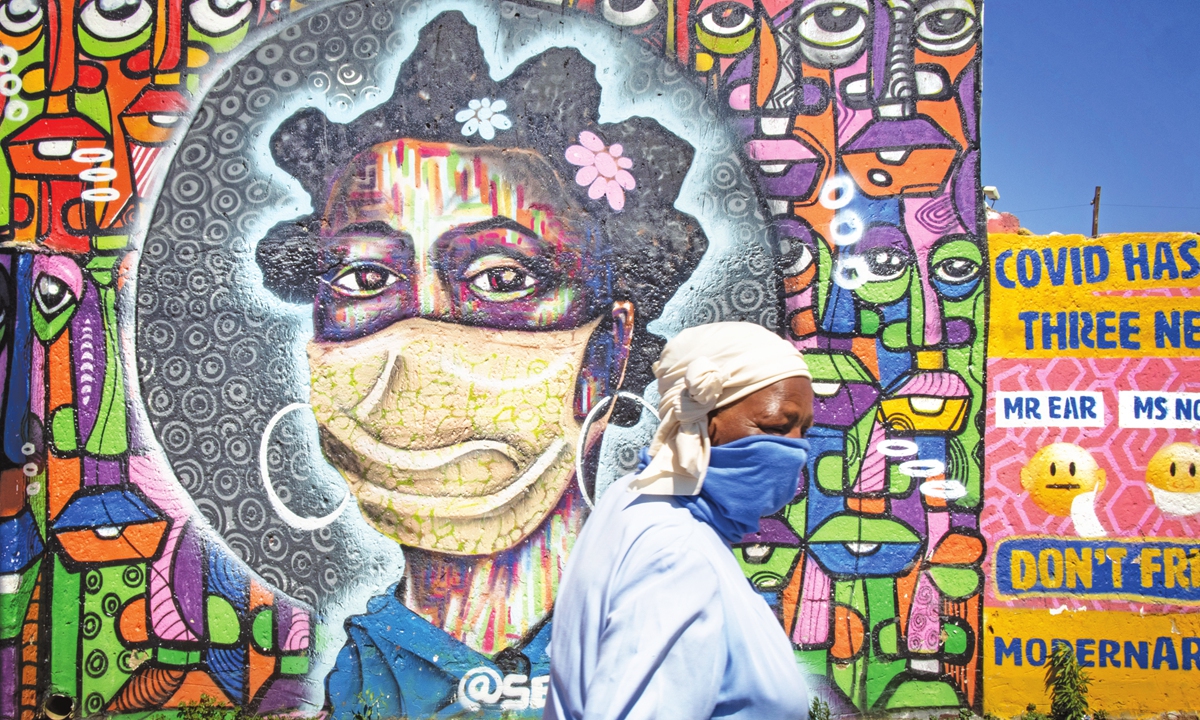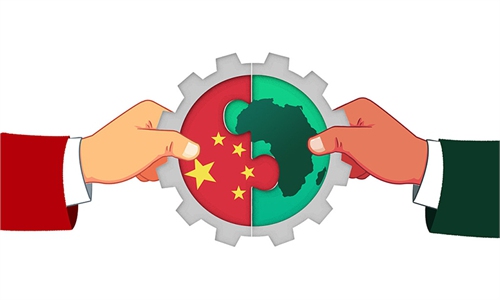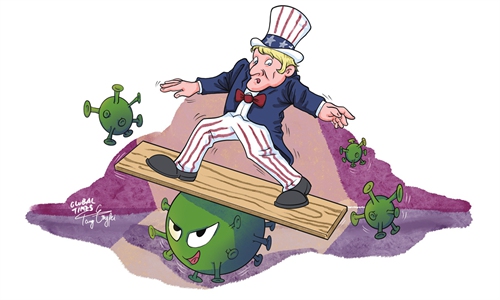West’s prejudiced Africa travel bans over Omicron will derail vaccination efforts

A Soweto resident walks in front of an informative graffiti art work educating local residents about the dangers of the coronavirus, Johannesburg, South Africa, 30 November 2021. Photo: IC
The global epidemiological situation characterized by the spread of COVID-19 keeps taking a turn for the worse exacerbated by unfortunate political dynamics.
On November 24, South Africa's Network for Genomic Surveillance announced it had detected a new coronavirus variant in the country called B.1.1.529, later named Omicron by the World Health Organization (WHO). The variant was said to have more than 30 mutations in the spike protein which increases its transmissibility. This means it could spread significantly faster than the original coronavirus variant and is potentially more effective in evading vaccine-induced immunity.
South African Minister of Health Joe Phaahla attributed the increase in the daily infections from 100 at the beginning of November to 1,200 at the end of the month in South Africa to the new COVID-19 variant. The WHO designated B.1.1.529 as a "variant of concern," naming it Omicron on November 26. South Africa's announcement of the new variant triggered frantic reactions from many Western countries. The country and the immediate neighbouring countries including Zimbabwe, Namibia, Botswana, Lesotho, and Eswatini were promptly added to the UK's COVID-19 red list. All flights from the six countries were suspended. Malawi and Mozambique were also on the list of travel restrictions of a number of other countries. The US, European Union (EU) and Canada also imposed travel bans on the southern African region. Other countries such as Israel, Morocco, Japan, and Rwanda followed suit. Justifying their decisions to close their borders, these countries claimed the bans were precautionary measures to contain the new variant.
These travel bans sparked an angry reaction from the affected countries, the World Health Organization and the African Union. South African President Cyril Ramaphosa criticized the travel bans as unscientific and discriminatory, arguing that his government has "rejected this notion that is being propagated by more developed economies and some smaller countries that the Omicron variant should lead to a blockage and a ban of travel."
Dr Ayoade Alakija, who serves on the African Union's African Vaccines Delivery Alliance, characterized the bans as unfair and informed by politics not science. She questioned why Western countries were locking away Africa and had not imposed travel bans on countries like Belgium and Netherlands where the Omicron variant had also been detected. The WHO added its voice to the criticism of the travel bans, calling on countries to follow scientific evidence and international health regulations instead of imposing restrictions that have a negative impact on livelihoods and economies. Malawi's President Lazarus Chakwera, who also serves as the chairman of the Southern African Development Community (SADC), blasted the travel bans as an expression of Afrophobia on the part of the countries who instituted them.
The decision to hastily impose travel restrictions on African countries was indeed rushed and bordering on hypocrisy. The UK was already struggling to contain COVID-19 spread prior to the detection of the Omicron variant in South Africa with a daily infection rate of between 4-5 percent. The US had a daily infection rate of 9.8 percent. This suggests the notion that African travelers were a risk is unfounded. These countries ought to put into place effective internal mechanisms in terms of policy and governance to reduce the spread of the virus among their populations. Perhaps the travel bans were a way of masking the failure of their own governments to deal with the pandemic internally. For countries which claim to uphold the virtues of openness and multilateralism, imposing unilateral and unjustified travel bans smacks of inconsistency.
This disappointing episode shows that Africa must never take the West at its word. These travel bans were imposed without due consideration of the devastating economic impact they were going to have on the countries concerned. Moreover, reports have since emerged showing that the Omicron variant has been detected in Scotland among people who have neither traveled to South Africa nor been in contact with any person who has. Yet no country among those which rushed to impose restrictions has banned flights from Scotland. This lends further credence to the argument that the travel bans on southern Africa were discriminatory, judging by the different treatment Scotland has managed to get.
It is not only the imposition of travel bans that is disheartening, but the Western media was also on hand labeling the new variant the "South African variant." Just as former US president Donald Trump regrettably and wrongly labeled the coronavirus the "Chinese virus." Such discourse has the unfortunate effect of stigmatizing and scapegoating some countries instead of focusing energy on tackling the pandemic. Stigmatization is also a disincentive for transparency and openness in the case of other countries that may discover new variants in the future. The way South Africa has been treated will certainly make other countries that detect a new variant to try to keep it a secret, thus derailing the global fight against the pandemic.
Most importantly, the Omicron situation highlights the self-defeatist nature of the vaccine nationalism approach adopted by the West. Since the beginning of the vaccination campaign, Western countries have used their financial and political power to hoard the available vaccines, leaving poor regions like Africa without access. As a result, almost 10 months since the vaccination campaigns began, only 10 percent of Africa's population has received a vaccine with just 6 percent having been fully vaccinated. All the while, some countries like Germany, Canada, Austria, and France have already begun administering booster shots to their fully vaccinated citizens. The West's approach to vaccine supply has effectively turned Africa into an unvaccinated zone.
The coronavirus can easily evolve among unvaccinated people, thus creating new variants against which vaccines may not be effective. Instead of imposing travel restrictions, the West should join players like China and the WHO's COVID-19 Vaccines Global Access (COVAX) in boosting vaccine supply in Africa through releasing excess vaccine stock and helping to set up vaccine production facilities. Travel bans are counterproductive and disproportionate.
The West should understand the COVID-19 pandemic is a global problem which can only be resolved through global coordination. Finally, the West's reaction to the new variant is particularly instructive to South Africa which has thus far shunned vaccine cooperation with China and expressed a preference for Western vaccines. The West cannot be a trusted partner in the fight against the pandemic. The imposition of travel bans stops the vaccine supply chain in its tracks, thus potentially derailing South Africa's vaccination campaign.
The author is the director for the Centre for Africa-China Studies at the University of Johannesburg, South Africa. opinion@globaltimes.com.cn



